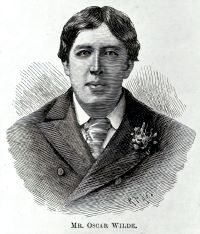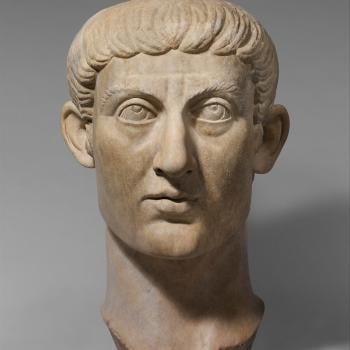 Irish playwright Oscar Wilde read the Gospels every day toward the end of his sentence at Reading prison. Sentenced to two years of hard labor for what England once called “gross indecency,” Wilde found himself suffering acutely. Humiliated by his losses and horrified by prison life, Wilde contemplated suicide. Bitterness threatened to consume him. In the intensity of his pain, he became fascinated by Jesus, whom he describes at length in a long letter he wrote to his lover Alfred Douglas from jail. That letter, which prison guards never let him send, became a short prose work called De Profundis–-from the depths. We associate Wilde now with masterworks like Picture of Dorian Gray, The Importance of Being Earnest, and Salome but De Profundis accomplishes something none of his more famous writing attempts. Wilde presents a startlingly original, utterly compelling take on who Jesus is.
Irish playwright Oscar Wilde read the Gospels every day toward the end of his sentence at Reading prison. Sentenced to two years of hard labor for what England once called “gross indecency,” Wilde found himself suffering acutely. Humiliated by his losses and horrified by prison life, Wilde contemplated suicide. Bitterness threatened to consume him. In the intensity of his pain, he became fascinated by Jesus, whom he describes at length in a long letter he wrote to his lover Alfred Douglas from jail. That letter, which prison guards never let him send, became a short prose work called De Profundis–-from the depths. We associate Wilde now with masterworks like Picture of Dorian Gray, The Importance of Being Earnest, and Salome but De Profundis accomplishes something none of his more famous writing attempts. Wilde presents a startlingly original, utterly compelling take on who Jesus is.
For Wilde, Jesus is an artist, a poet. An Irish Catholic to the bone, Wilde calls the central character of the Gospels “Christ.” He calls the Gospels themselves “prose poems.” Wilde proclaims about Jesus that “the very basis of his nature was the same as that of the nature of the artist–an intense and flamelike imagination.” Jesus approached people, Wilde says, with an “imaginative sympathy” which is the “secret of creation” in Art. Jesus, says Wilde, “understood the leprosy of the leper, the darkness of the blind, the fierce misery of those who live for pleasure, the strange poverty of the rich.”
Life as Poem
Wilde considers Jesus’s life “the most wonderful of poems.” There is “nothing in the entire cycle of Greek tragedy to touch it,” Wilde insists. Wilde is thinking of the passion story: the little supper with friends, the anguish in a moon-lit garden, the friend who betrays him with a kiss, the “coronation ceremony of sorrow,” the painful death before his mother’s eyes, the soldiers throwing dice for his clothes, the burial in perfumed Egyptian linen. Wilde calls Jesus’s crucifixion “the terrible death by which he gave the world its most eternal symbol.” In all of this, Wilde finds a revelation of the sublime beauty of sorrow. “Where there is sorrow, there is holy ground,” Wilde observes. He quotes Dante, who wrote that “sorrow remarries us to God.” There is about sorrow,” Wilde says, “an intense, an extraordinary reality.”
His perception through the Jesus story of the sanctity of sorrow enables Wilde to transform his own suffering. Prison scourged him. No matter how bright and beautiful the day, he writes, “It is always twilight in one’s cell, as it is always twilight in one’s heart.” Wilde’s mother died while he was in prison. Feeling unbearable grief and shame, he arrives at a transformative conviction: “I have got to make everything that has happened to me good for me. The plank bed, the loathsome food . . . the harsh orders . . . the silence, the solitude, the shame–each and all of these things I have to transform into a spiritual experience.” Wilde accomplished this.
Transforming Shame
Oscar Wilde reached an emotional nadir when England permanently removed his children from him. Wilde lost everything–his name, position, happiness, freedom, and wealth. What wrecked him most, though, was the loss of his children. “I still had my children left,” he writes, but “suddenly they were taken away from me by the law. It was a blow so appalling that I did not know what to do.” What he does is drop to his knees and pray, although “praying” is not what he calls it. He bows his head, weeping, and reflects, “The body of a child is as the body of the Lord: I am not worthy of either.” He says about this experience “That moment seemed to save me.”
Wilde explains, “I saw then that the only thing was for me to accept everything.” Acceptance of eveything frees Wilde. He considers radical acceptance to be a state of humility, and humility to be the key to spiritual and artistic power.
Humility as Freedom
“Humility in the artist is his frank acceptance of all experiences,” Wilde observes. For Wilde, humility–the frank acceptance of all experiences–was Jesus’s genius. Wilde also admires Jesus’s compassion for the broken-hearted and skepticism about privilege. “Pity he has . . . for the poor,” Wilde writes, “for those shut up in prisons, for the lowly, for the wretched; but he has far more pity for the rich, for the hard hedonists, for those who waste their freedom in becoming slaves to things, for those who wear soft raiment and live in kings’ houses.”
“Like all poetical natures,” Jesus “loved ignorant people,” Wilde suggests, knowing that “in the soul of one who is ignorant there is always room for a great idea.” Jesus, Wilde claims, “could not stand stupid people, especially those made stupid by education.” In Jesus’s dialogues with the religious elites of his time Wilde sees a profound rebuke to middle-class privilege and intellectual complacency. Jesus “took a keen pleasure in pointing out to them that though they were always reading the law and the prophets, they had not really the smallest idea of what either of them meant.” Wilde’s list of the shortcomings Jesus finds among social elites focuses on the lack of humility.
Affluence as Handicap
Affluent people resist new ideas, overvalue themselves, worship success, accumulate stuff, and demand respectability, Wilde says. Jesus critiques affluence as a life principle. Jesus “treated worldly success as a thing absolutely to be despised,” Wilde notes. This Jesus looks at wealth “as an encumbrance to a man.” That idea delights Wilde who, in hindsight, considered himself to have gotten spiritually entrapped by his owm wealth.
Wilde also loves how Jesus “would not hear of life being sacrificed to any system of thought or morals.” The worst people–for Wilde and for Wilde’s Jesus–are those who uphold and aid “the heavy, cumbrous, blind, mechanical forces of society.” Jesus’s morality “is all sympathy,” Wilde says, “just what morality should be.” When some angry moralists bring him a woman caught in adultery, Wilde remembers, Jesus “wrote with his finger on the ground as though he did not hear them, and finally, when they pressed him again, looked up and said, ‘Let him of you who has never sinned be the first to throw the stone at her.’ It was worth while living to have said that.” Wilde repeatedly applauds Jesus’s originality.
No Christians Since Christ?
Wilde offers his readers a show-stopping thought. He says “there were Christians before Christ” but “there have been none since.” Wilde means that “intense and flamelike” imaginations beautified life immeasurably before Jesus but that since Jesus, the “blind, mechanical forces of society” co-opted the Jesus-way. Moralists claim him. Churches use his name to inspire fear. Politicians invoke him to construct their public images. It’s enough to put anyone off Jesus for good.
I get it. I do live in some wild, mostly inexplicable encounter with the Jesus-poetry begun in the Gospels, but my Jesus-experience resists tidy theological formulation. Creed-statements and catechisms send my experience into hiding. The mixing up of Jesus’s name with abhorrent social and political phenomena bums me out. And moralism just sucks.
Because of all this, I have never been able to bring myself to evangelize, although I attend an evangelical church. The language my church uses about Jesus is small, formulaic, and unimaginative. Annoyingly human, weirdly totalitarian, and totally unpoetic. I might become an evangelist, though, if it were Oscar Wilde’s Jesus I got to promote.













